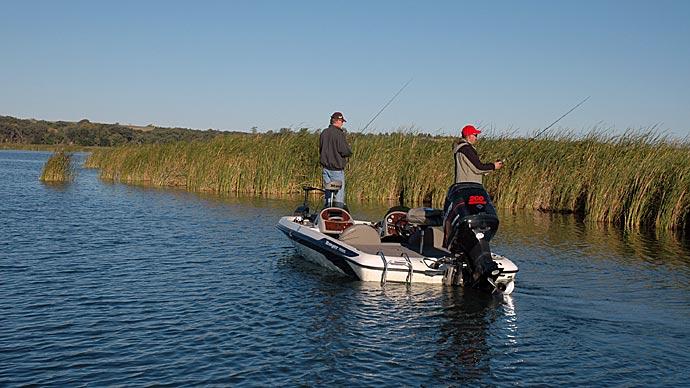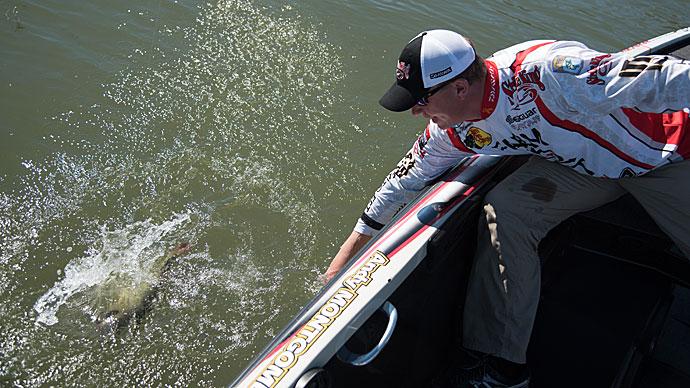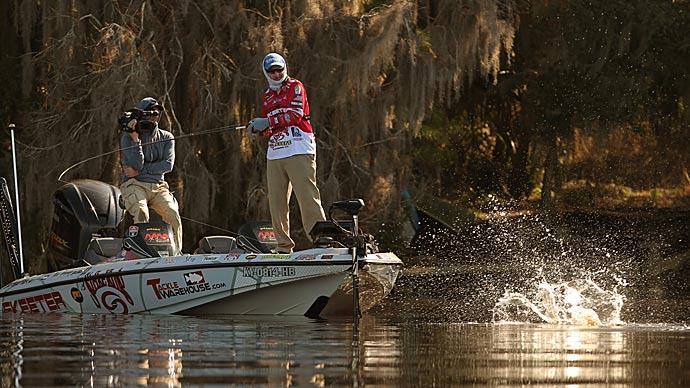| Wanted: Professional bass angler |
|
Skills Required: The ability to locate and catch bass on any body of water under any conditions. Hours: Must be available 24 hours a day, 7 days a week. Responsibilities: Travel across the country participating in national bass tournaments. Must be able to work seminars and public appearances upon sponsor's request. Travel: Extensive travel required. Must be able to leave home for 200 days a year. Working Conditions: Mostly outside work. Must tolerate freezing temperatures, high wind, rain, sleet, and occasional snow. Salary: Earning potential up to $100,000 per month. Income is based on performance and is not guaranteed. Insurance/Benefits: None Application Requirements: Must have reliable boat and truck, $25,000 start-up money, and really, really love to bass fish. |
This help-wanted ad may not sound very appealing to many, but to hardcore bass fishermen, it reads like a dream job. Every year, thousands of bass fishermen are tempted by this job. Of those interested, several hundred inquired. Of those who inquire, only a handful commits and turns in a resignation to their current employer.
Knowing that a tournament bass fishing career can be as elusive as the scaly creature at the center of the sport, why would somebody trade the security of a full-time job to pursue professional fishing? Here are a few answers:
Curt Lytle: Love The Outdoors
In 1997 Curt Lytle was designing piping systems on Navy ships in the Norfolk Naval Shipyard in Virginia. He had an excellent job as a mechanical engineer with the Department of Defense, making $38,000 a year with benefits and plenty of security. But he was growing restless after six years of routing pipe on aircraft carriers.
His restlessness stemmed from a yearning to do something more rewarding and more fulfilling. His restlessness fed off the complacency of a government job. But most of all, his restlessness was caused by a deep yearning to be outdoors.
During his tenure as a mechanical engineer, Lytle delved into the only activity that seemed to calm him - competitive bass fishing. While fishing the Red Man Tournament Trail's Piedmont Division in the early 1990s, he discovered that tournament bass fishing seemed to fill the growing voids in his life.
Lytle, a fierce downhill ski racer in college, had a zest for competition, and tournament fishing seemed to re-awaken his competitive spirit.
Tournament fishing also put his problem-solving skills to work much differently - a more rewarding way. Instead of designing conduits for a faceless entity, he began designing fishing rods and modifying lures to catch more bass.
Most of all, tournament fishing became the gateway to Lytle's true passion, the outdoors. "My real dream job would be to wander around in the woods for days and get paid for it," he jokes. "Bass fishing is the next best thing."
In the summer of 1997, Lytle resigned from the shipyard and went fishing. Lytle's decision to quit his job, however, seemed preordained. He had already used all of his vacation time fishing the 1996-1997 season and entered all of the Wal-Mart FLW Tour events and B.A.S.S. Invitationals for the 1997-1998 season. "Asking for ten weeks off when you do not have any vacation time left does not sit well with the Federal Government," Lytle says. "The only thing to do was quit."
Things have not been easy for the 32- year-old bass pro since August of 1997. He has slept in his truck, pinched pennies, and taken on occasional part-time ship design work to keep himself afloat during the lean times.
In his rookie season on the Wal-Mart FLW Tour, the Virginia-based pro only cashed one check. If it had not been for two Red Man Tournament Trail victories that year, Lytle would have been back at the shipyard. "1997 and 1998 were painful years," Lytle says. "For three months, I was unemployed, and I lived off the winnings from a 12th place B.A.S.S. finish and a couple of good Red Man Tournament Trail checks."
In 1998, Lytle had to work part-time as a consultant with a private yacht-building firm. The part-time job and two Red Man Tournament Trail checks prevented a massive debt in 1998, but the financial stress was constant. He says the financial strain of that season affected him mentally. "The worst part about the 1998 season was that I was around the fish to finish high in several tournaments, but the mental stress of being broke crushed me. Mentally, I just choked."
Perhaps the only silver lining in Lytle's lackluster season was that he survived his first year fishing professionally. Most importantly, he financed it independently and avoided debt, the primary pitfall of most tenderfoot pros. That gave him the confidence to give the professional fishing circuits another whirl in 1999.
At the dawn of the 1999 season, Lytle returned with a new attitude. "I figured it couldn't get any worse," he says. "I was already at the bottom of the barrel; I had nowhere to go but up." And up he went.
Lytle started his 1999 season with a bang, finishing second at the Wal-Mart FLW Tour season opener. That finish bolstered Lytle's career with a financial foundation and a new wave of fishing confidence. Since then, he has finished sixth in the Wal-Mart Open, won two EverStart tournaments, and won a B.A.S.S. Invitational.
Despite his fishing success, Lytle continues to live a modest life. He has relinquished his part-time job, but he knows the tides of the fishing game can turn at any time. He still sleeps in his truck and is not above returning to part-time work, if necessary, to continue pursuing his passion.
"I am grateful to have an opportunity to spend every day outdoors fishing," he says. "It is something I do not take for granted."
Chuck Economou: Casting Off Material Possessions
"I gave up debits and credits for bassing bucks," laughs Chuck Economou, a former CPA from Michigan. Suppose anyone would know the financial risks of a bass fishing career. In that case, it is Economou who gave up a promising career in accounting to pursue bass fishing on a professional level.
Ten years of accounting taught Economou how easy it was to become a slave to debits and credits. "By materialistic standards, I had it all," he says. "I had a good job as a controller for a manufacturing firm in Detroit. I was making $70,000 a year. I had a nice house on a take. But I was working 60-hour weeks to keep all of that. I could never enjoy anything I had because I was working all the time to pay for it."
Like many bass anglers, Economou had an unquenchable passion for fishing. "I worked about five minutes from my house," he says. "I used to come home on my lunch hour, jump in my boat, and fish during lunch in my three-piece suit. People around the lake thought I was crazy."
Economou says that his full-time fishing career was unintentional. Becoming a professional angler was a case in which an extended vacation turned into a new career. "In 1994, the company I worked for was downsizing. Two people that worked under me were going to get cut. I wanted some time off, so I told the VP to take me out and keep the two other employees."
Originally, Economou planned on taking off only six months to fish. During his six-month respite, the vacationing accountant fished local tournaments and began doing well. He even won $4,000 at one event.
Shortly after that, he decided to try bass fishing's big leagues and entered the 1995 Wal-Mart FLW Tour and B.A.S.S. Invitationals. A six-month sabbatical suddenly turned into an 18-month fishing tour.
Economou experienced limited financial success that first year, but financial success was not his primary goal. He just wanted to go rod to rod with the best in the country to see how he measured up. He measured up pretty well, accumulating enough points to qualify for the Wal-Mart FLW Tour, Championship, and the B.A.S.S. Top 100. "Then I thought, well, here I am living a dream; I can't quit now. So I signed up for another year of FLW and B.A.S.S. Top 100 tournaments," Economou says. "And here I am five years later."
Economou, who now has a home in Florida, tours the country in a camper van fishing tournaments. On two occasions, the 44-year-old pro has come close to national titles. In 1998, he finished second in a B.A.S.S. Top 150, and in 1999 he finished second at the Memphis stop on the Wal-Mart FLW Tour.
He says he has no regrets about his decision to keep fishing. "I certainly do not make as much money as I did as a CPA, but I have been much happier over the last five years."
He admits fishing is hard work, but the highs far outweigh the lows. "I never thought fishing could be such hard work, but a 12-hour day on the water is far better than a 12-hour day crunching numbers. And when you put in the time, locate fish, and cash a good check, it is gratifying."
David Walker: "I Never Wanted To Go Back"
The day after David Walker graduated from high school, he went to work in a factory in Michigan. A few years later, Walker moved to Kentucky and ... went to work for a factory. In fact, for the last 15 years, Walker, in one capacity or another, has worked in a factory. All that time, he knew there had to be a better way. He wanted more out of life, a more engaging career.
Walker discovered competitive bass fishing at the ripe age of 20 when he fished a small pot tournament. From that moment on, with the patience of a wading heron, Walker began plotting a new career. He joined a bass club, fished as a co-angler, and read everything about bass fishing.
Then Walker began climbing the tournament ladder, starting with the Red Man Tournament Trail. He joined the Wal-Mart FLW Tour in 1996 and became a perennial top-10 qualifier. After racking up seven top-10 finishes in just two years on tour, the Kentucky angler felt the time was right to move to full-time bass fishing.
In the fall of 1998, he turned in his resignation as a punch press operator and never looked back. "When I quit that job, I knew, without a doubt, that I never wanted to go back," says Walker with an undeniable tone of determination. That determination has instilled an extreme work ethic in Walker that is unequivocal.
Walker entered Wal-Mart FLW Tour, EverStart, and B.A.S.S. tournaments in 1999. "I fully committed to it," he says. "It was not a matter of - well, I will see how I do in the first couple of tournaments. I had to make this work because there was no safety net between fishing and the factory."
The 35-year-old bass pro brought his white-hot desire for a new career out on the road and put it to work finding fish. And he found fish: enough fish for two top-10 finishes in the EverStart Series, enough fish for a birth into the B.A.S.S Top 150 circuit, and enough fish to win the Wal-Mart FLW Tour's Land O'Lakes Angler of the Year title. To date, Walker has claimed 11 Wal-Mart FLW Tour top-10 trophies.
Despite his success, Walker has not let up on his intensity. He is well aware of the competition that is banging on the door. Whenever he needs motivation, he briefly thinks about 15 years of factory work and fishes just a little harder.
Content provided by Bass Fishing Magazine, the official publication of FLW Outdoors




